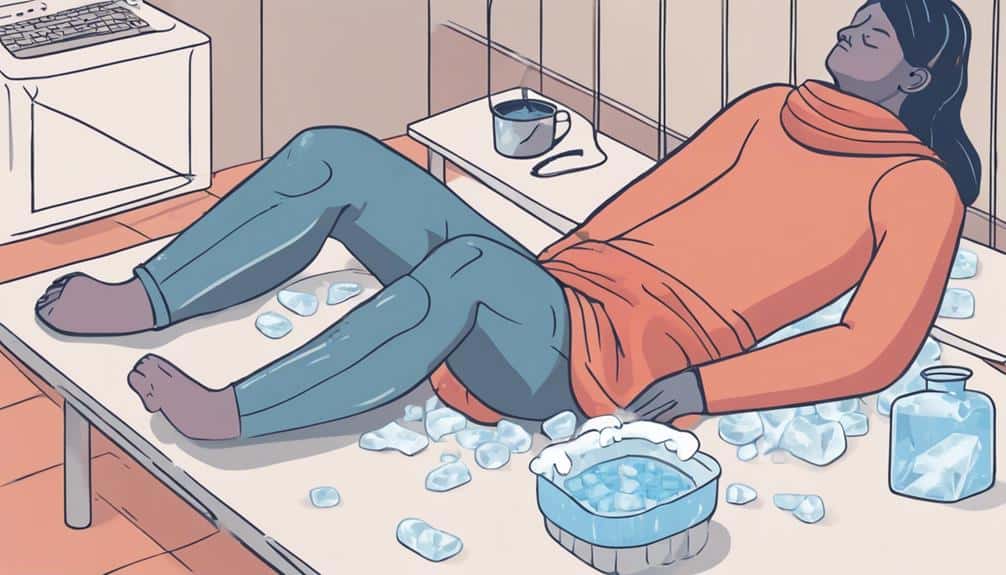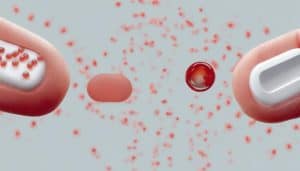Addressing the underlying causes is crucial when a crick in your neck strikes, from muscle strain to mental health concerns. Start by incorporating gentle stretching exercises, like neck tilts and shoulder rolls, to improve flexibility and reduce muscle tension. Next, try heat and cold therapy remedies to alleviate pain and inflammation. Maintaining proper posture and practicing relaxation techniques, such as deep breathing or meditation, can also provide relief. Combining these remedies with additional methods, like supportive pillows and stress-reducing activities, can help you regain comfort and mobility. Dive deeper to discover the most effective combination of remedies for your unique needs.
Key Takeaways
• Gentle stretching exercises, such as neck tilts and shoulder rolls, can help alleviate discomfort and stiffness in the neck.
• Alternating between heat and cold therapy can provide effective relief from neck cricks and reduce inflammation.
• Maintaining proper posture and correcting muscle imbalances can prevent recurring neck cricks and alleviate strain on neck muscles.
• Relaxation techniques like deep breathing, meditation, or yoga can reduce tension in the neck and promote relaxation.
• Using a supportive neck pillow while sleeping and applying heat through a warm compress or shower can relax tense neck muscles and improve circulation.
Understanding Neck Cricks and Causes
Your neck crick may seem like a minor annoyance, but it can have a significant impact on your daily life, causing stiffness, limited mobility, and muscle knots in the neck or shoulders.
A stiff neck can make everyday activities like turning your head or looking over your shoulder a painful challenge. But what's behind this pesky problem? Muscle strain, neck sprains, and musculoskeletal health conditions are common causes of neck cricks.
Additionally, mental health concerns like stress, anxiety, and depression can contribute to neck muscle tightness. It's important to recognize that neck cricks aren't just a physical issue but also connected to your mental well-being.
If your neck pain persists after a week of home remedies or you experience symptoms like numbness or weakness, seeking medical attention is crucial. Understanding the causes of your neck crick is the first step towards finding relief and improving your overall musculoskeletal health.
Gentle Stretching Exercises

To take the first step towards alleviating your neck crick, incorporate gentle stretching exercises into your daily routine, as they can help improve flexibility and reduce muscle tension. By targeting different neck muscles, you can effectively alleviate discomfort and stiffness.
| Stretch | Target Muscle | Benefits |
|---|---|---|
| Neck Tilts | Scalene and suboccipital muscles | Improves flexibility and range of motion |
| Head Tilts | Sternocleidomastoid and scalene muscles | Reduces muscle tension and improves posture |
| Shoulder Rolls | Trapezius and rhomboid muscles | Relaxes shoulders and improves muscle strength |
| Upper Trapezius Stretches | Upper trapezius muscle | Relieves tension and improves range of motion |
Heat and Cold Therapy Remedies

When dealing with a crick in your neck, incorporating heat and cold therapy remedies into your treatment plan can provide significant pain relief and reduce muscle tension.
For the first 48 hours, apply cold therapy to reduce inflammation and numb the pain. You can use an ice pack or a cold compress wrapped in a towel to avoid direct contact with your skin.
After 48 hours, switch to heat therapy to increase blood flow and relax tight muscles. You can use heating pads, warm towels, or take warm showers to relax your muscles.
Alternatively, you can try alternating between heat and cold therapy for effective relief. Cold therapy helps reduce swelling and numb the area for pain relief, while heat therapy increases blood flow to relax muscles.
Posture Correction and Relaxation

How do you sit, stand, and move throughout the day, and could your daily habits be contributing to that nagging crick in your neck? Maintaining proper posture can alleviate strain on neck muscles and prevent cricks.
When you slouch or hunch over, you're creating muscle imbalances in your neck, leading to stiffness and discomfort. By practicing good posture habits throughout the day, you can prevent recurring cricks in the neck.
Take a moment to assess your daily routine. Are you guilty of slouching over your computer or phone? Make a conscious effort to correct your posture and relax your neck muscles.
Relaxation techniques like deep breathing or meditation can help reduce tension in the neck, alleviating cricks and stiffness. By combining posture correction with relaxation, you'll be well on your way to a crick-free neck.
Additional Relief Methods

You can explore additional relief methods to complement your posture correction and relaxation practices, including gentle exercises, supportive sleep habits, and stress-reducing activities that target neck tension.
Gentle neck exercises, such as slow and controlled neck stretches, can improve flexibility and reduce stiffness, helping to alleviate the crick in your neck.
Using a supportive neck pillow while sleeping can help maintain proper alignment and prevent further discomfort.
Applying heat, through a warm compress or shower, can relax tense neck muscles and improve circulation.
Practicing stress-reducing activities like meditation or yoga can also help alleviate tension in the neck and promote relaxation.
If your crick persists, consider seeking professional help from a chiropractor or physical therapist for targeted treatments and personalized care. They can provide customized exercises and manipulations to relax tense muscles, improve flexibility, and promote recovery.
Frequently Asked Questions
How to Get a Crick Out of Your Neck Fast?
When you're wondering how to get a crick out of your neck fast, it's crucial to understand that a combination of quick fixes and relaxation techniques can provide swift relief.
You can try applying ice for 15-20 minutes to reduce inflammation, followed by a warm compress to relax stiff muscles.
Gentle stretching exercises and massages can also help release tension and improve mobility.
How Do You Get Rid of a Stiff Neck Asap?
To quickly get rid of that stiff neck, start by stopping whatever activity is exacerbating the stiffness.
Next, apply ice for 15-20 minutes to reduce inflammation and pain.
Follow up with a warm compress to relax tense muscles.
Take an over-the-counter pain reliever if needed.
Gentle stretching exercises like neck tilts and shoulder rolls can also help.
What Is the Best Medicine for Neck Crick?
You're stuck with a neck crick that's tighter than a drum, and you need relief fast!
When it comes to medication, you've got options. For mild discomfort, over-the-counter pain relievers like ibuprofen or acetaminophen can help.
But if your crick is severe, prescription muscle relaxants or NSAIDs might be the way to go. Topical creams or patches can also provide targeted relief.
Consult a healthcare pro to determine the best medicine for your specific neck crick and overall well-being. They can take into account your medical history, allergies, and any other medications you may be taking to find the best option for you. In addition to medication, they may also recommend physical therapy, stretching exercises, or other forms of treatment to alleviate your neck crick. If you are experiencing irritation bumps, your healthcare professional can also provide guidance on home remedies for irritation bumps that may help soothe your skin and promote healing. It’s important to follow their advice and not self-medicate to ensure that you are properly addressing your symptoms and promoting your overall well-being.
Why Won't the Crick in My Neck Go Away?
You're frustrated because that stubborn crick in your neck just won't budge. It's likely because you're not addressing the root cause.
Are you experiencing underlying muscle strain, poor posture, or cervical spine issues? Or could it be stress, anxiety, or mental health concerns? Identifying the culprit is key.
You might need to seek professional help or make lifestyle changes to alleviate the crick. Don't give up – with the right approach, you can find lasting relief.



